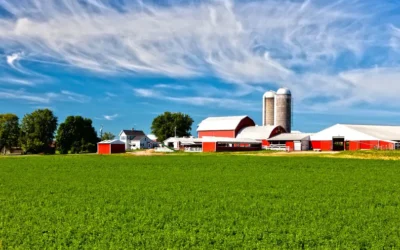Today, we are witnessing a seismic shift in the world of agriculture. For the first time, food companies throughout the world are making the choice to invest in more sustainable supply chains and motivated to improve the sustainability of their food products. We’ve found many are still struggling with the challenge of implementing solutions in the disaggregated and dynamic supply chains found in agriculture. Below we have identified five companies that we see as implementation leaders in this space.
Land O’ Lakes: Embracing organizations that already have strong relationships with farmers
Land O’ Lakes’ Truterra and its technology partner FieldAlytics by Ever.Ag are documenting sustainability with primary data from retailers of fertilizers, seeds, and treatments to support environmental claims. In this work, they have chosen to work with ag retailers’ crop advisors to improve the completeness of farm-level datasets.
In-market advisors have spent their careers earning the trust of their farmer customers and also have the know-how and the incentives to anticipate where a farm will need inputs, like fertilizers and herbicides, and are using sales planning and execution software to document anticipated and actual usage.
By acknowledging that sustainability is a relationship business and implementing with trusted outside partners, Truterra has achieved high-quality claims that are supported by equally high-quality datasets. These datasets include accurate quantities of inputs and numbers of tillage passes, soil nutrient maps, and yield maps. The high data quality is required to assure brands that their investments in sustainable farming practices are making a measurable difference.
A2 Milk and A Greener World: One process, but an individualized approach
A2 Milk Company, in collaboration with A Greener World, is implementing a nuanced sustainability process: a process that considers the unique circumstances of each farm. Recognizing that every operation has unique strengths and challenges, they emphasize farm-specific plans –called regenerative agricultural plans– over blanket policies.
Every farm in their program has one of these plans, which includes the same categories of requirements across the program – but are designed specifically for each operation.
This solution avoids the trope of a ‘one size fits all approach’ and we believe it will achieve documentable progress on a holistic set of sustainability indicators, including carbon footprint, soil quality, animal welfare and more across a diversity of farm types and regions. From our perspective, the A2 Milk Company sustainability program process is both credible and localized (i.e., implementable).
Barry Callebaut: Acknowledging the limitations of current technologies
Chocolate manufacturer Barry Callebaut stands out to us for its honest assessment of current technology. The company purchases dairy ingredients and is working to reduce emissions from the cows in its supply chain.
The company deployed a feed additive, Agolin, in its supply chain and asked farmers to verify whether or not the theoretical improvement in feed efficiencies actually materialized on their operations. Its analysis, displayed publicly on its website, uncovered that efficiency improvements varied greatly between regions – a clear demonstration to their customers of the complexity around deploying current sustainability technologies as a solution.
Upfield: Transparency in progress
Upfield, the parent company of Country Crock, I Can’t Believe It’s Not Butter, and Flora, has made commendable strides in sustainability by prioritizing transparency.
The company has an easily accessible ESG Center on its website that shares annual progress updates. This open-access information underscores Upfield’s commitment to maintaining trust with their customers, investors, and other stakeholders, demonstrating their belief that transparency is a crucial pillar of sustainability work and environmental claims.
National Milk Producers Federation: Achieving scale-ability
The National Milk Producers Federation’s Farmers Assuring Responsible Management (FARM) Animal Care program has achieved tremendous adoption. It has been embraced by 99% of dairy farms in the U.S.
How did they achieve success at such scale?
First, the program was designed not for perfection, but for implementability. For example, the program was created by an advisory council made up of scientists, veterinarians, industry representatives, and farmers throughout the country. This design process resulted in a program that was doable in a variety of regions, organizational structures, and farming operations.
Second, they have supported the program with thoughtful resources, verifications, metrics, and more to users, helping to bolster adoption. Check out the incredible resources page here.
And third, they focused on commercial relationships– working with brands and end-users to achieve acceptance and milk cooperatives to lead deployment.
The result? They have enabled positive change across the entire industry. Now they are developing the third version of the FARM Environmental Stewardship program, which has so far been implemented on 1.5% of dairy farms across the country. With their focus on implementability, we bet they’ll be at 99% soon.
At Ever.Ag we are working alongside food companies and farmers on the journey towards long-term sustainability. We have learned that all successful sustainability programs need at least the following tenants:
1) Sustainability is a relationship business. Successful implementation requires developing those relationships or leveraging organizations that already have developed the relationships.
2) Sustainability programs need to be localized, but the process should not be and should be consistent across operations.
3) Current technologies have limitations. It’s important to be honest about that.
4) Transparency breeds trust from everyone involved, including customers, employees, and suppliers.
5) From the outset, design the program with adoption and scalability in mind
Please reach out to talk to us about Sustainability by Ever.Ag.
We’re eager to speak with you about scaled sustainability programs that include high-fidelity data and provable results.


